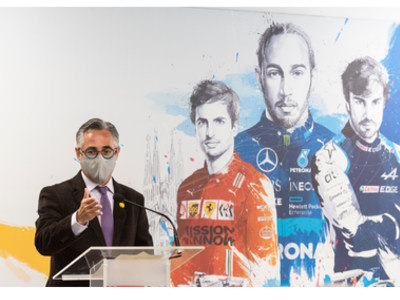The Minister of Business and Knowledge announces his intention to negotiate longer-term contracts for this event, once the pandemic is over.

The Minister for Business and Knowledge, Ramon Tremosa, assured today that "the Government of Catalonia will give its full support to Formula 1 to continue at the Barcelona-Catalonia Circuit. The Government’s interest is to maintain the Catalunya-Barcelona Circuit as the permanent headquarters of F1," he said. During the presentation of the Formula 1 Aramco Grand Prix of Spain 2021, which will be held without public at the Montmeló facilities (Vallès Oriental) on May 7th, 8th and 9th . Tremosa stressed the importance of "saving the continuity of the F1 GP here at home.” "If you take yourself off the calendar you never know when you’ll be able to get back on it: more and more cities, regions and countries know the extraordinary impact and potential of an event of this nature," he said.
The Barcelona-Catalonia Circuit, which this year celebrates its 30th anniversary, will host an F1 Grand Prix for the 31st consecutive year. “We cannot lose this continuity; we must take advantage of these 30 years of good work to maintain our privileged position, and to keep Barcelona as a fixed event on the calendar," the minister assured. For this reason, he has announced his intention to "negotiate longer-term contracts when the situation returns to normal", as this year both the training sessions and the race itself will be held behind closed doors, due to Covid-19. To contain the pandemic, strict security measures will also be enforced for the 2,000 people - including drivers, teams and organization officials -participating in the event. Last year, 5,467 PCR tests were performed on drivers, team members and personnel in one week, with negative results across the board.
Tremosa also praised the public-private partnership "that we’ve put into practice in Catalonia in many areas, including sports, and which have become a model of success.” The Minister pointed out that for every public euro invested in the Circuit, a return to GDP of between 7 and 10 euros is generated. That’s income that benefits both Montmeló and the surrounding municipalities, the city of Barcelona, and the Catalan economy as a whole. "The Circuit and ‘Fira de Barcelona’ are two very clear examples, in terms of cost-benefit analysis, proving that well-invested and managed public funds can generate much larger returns," he summed up.
The 31st edition of the Formula 1 GP not only solidifies the Barcelona-Catalonia Circuit as a classic event on the competition calendar, but also underscores its role as one of the leading racing infrastructures in the world, hosting trials for some of the principal motor competitions. The Minister explained that this type of event "places Catalonia and Barcelona on the world map", and also referred to the competition’s links to Catalan society: "Catalonia is an ‘motor’ country: we have factories and industry, but we also have fans and champions; and because of all this we’re host to one of the top sporting events in the sector.”
RACC President Josep Mateu also took part in the presentation, along with the Mayor of Montmeló, Pere Rodríguez; former F1 driver Pedro Martínez de la Rosa; Ferrari test driver Marc Gené and European Regional Formula driver by Alpine, Belén García.